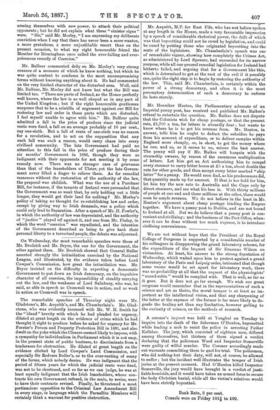Mr. Balfour commented drily on Mr. Morley's very strong censure
of a measure of which he knew nothing, but which he was quite content to condemn in the most uncompromising terms without knowing anything about it. He had commented on the very limited character of the disturbed area Well, said Mr. Balfour, Mr. Morley did not know but what the Bill was limited too. " There are parts of Ireland, as the House perfectly well knows, where the law is as well obeyed as in any part of the 'United Kingdom ; but if the right honourable gentleman supposes that to be a scintilla of argument against our Bill for restoring law and order in those parts which are disturbed, I feel myself unable to agree with him." Mr. Balfour quite admitted a fall in the price of produce since the judicial rents were fixed, a fall on an average probably of 16 per cent., say one-sixth. But a fall of rents of one-sixth was no reason for a revolution, and to act on the supposition that any such fall was such a reason, would carry chaos into every civilised community. The late Government had paid no attention to this fall in the price of produce during their six months' Government in 1886, though they were so indignant with their opponents for not meeting it by some remedy now. There was no stronger case of grievance than that of the leaseholders of Ulster, yet the late Govern. ment never lifted a finger to relieve them. As for remedial measures without the restoration of the authority of the law, the proposal was childish. What was the use of a Purchase Bill, for instance, if the tenants of Ireland were persuaded that the Government was so weak that, by only holding out a little longer, they would get their land for nothing P Mr. Morley's policy of taking no thought for re-establishing law and order, except by giving way to Irish demands, was a policy which could only lead to Separation. After a speech of Mr. H. Fowler's, in which the authority of law was depreciated, and the authority of "justice " played off against it, and one from Mr. Finlay, in which the word "coercion" was repudiated, and the intention of the Government described as being to give back their personal liberty to a terrorised people, the debate was adjourned.














































 Previous page
Previous page